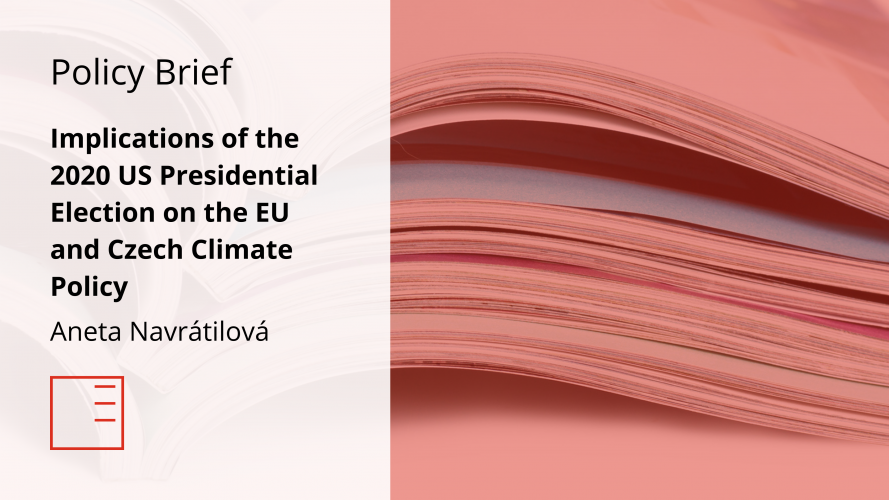POLICY BRIEF: Implications of the 2020 US Presidential Election on the EU and Czech Climate Policy
In her brief, Aneta Navrátilová writes about the implications of the 2020 US Presidential Election on the EU and Czech Climate Policy
More than anything, 2020 will be remembered for fighting against the world-wide Covid-19 pandemic which has reshaped all of our societies in dramatic ways. Once again, it has highlighted a latent conflict between nation-states and sovereignty, real or perceived, on one hand, and international, if not supranational, cooperation and multilateralism on the other. The crisis exacerbated existing conflicts between nationalists and national conservatives, prominently predisposed towards isolationism, exemplified most acutely in Trump’s America First agenda, and progressives and liberals on the other hand arguing for deepening integration, strengthening multilateralism, and international cooperation to tackle global crises. The US elections became emblematic of this wider, more fundamental struggle, as well as the societal polarization that, to varying degrees, haunts the rest of the developed world. Yet, with a Trump soundly rejected in a landslide election loss, one can wonder whether his loss portends similar rejections of populism and national conservatism across the globe.
The 2020 US presidential election was unprecedented, fevered, divisive, and emotional for various reasons. Firstly, the Republican ticket of incumbent President Donald Trump and Vice President Mike Pence was defeated. Secondly, Joe Biden obtained the largest share of the people’s vote against his opponent and the highest turnout in the last one hundred years was reached in this year’s election, despite the ongoing coronavirus pandemic, referring to an increased concern about future direction of the US. And lastly, as Biden won the election with flying colours, the whole world is now contemplating what will change. Not only on the domestic level, but also the international one.
You can read the full brief using the PDF button.
#USA #Climate #Presidential elections
Communications Specialist
Related articles
- BLOG | Migration and climate at the forefront of the European elections in the Czech Republic. What does our research tell us about them?
- Op-Ed | Subsidised fossil fuels are a major obstacle to solving the climate crisis. The Czech Republic and the world must confront it
- BLOG | Money or planet? Government Climate Policy | EU must emphasise social justice
- Background Study | Minerals and Metals for the energy transition
- Background paper Think Tank Forum | Green agenda in the Western Balkans
- Policy Paper: The Future of Energy Poverty: Will the Social Climate Fund be enough for a Just Transition?
- Evaluating Transatlantic Relations – For better or for worse?
- EU MONITOR: AUKUS to torpedo the EU-Australia FTA?
- EU MONITOR: How will CBAM affect manufacturing industries in the Czech Republic?
- The Transatlantic To-Do List: Biden's Progress Report
- Policy Paper: China vs. US: The Green Energy Race
- REPORT: Online Expert Exchange: Visegrad perspectives on the "Fit for 55" climate package
- US back in climate business: implications for global climate action
- POLICY PAPER: 100 days of Biden’s new transatlantic strategy – where does Central and Eastern Europe stand?
- What will Draghi’s government mean for Italy’s climate policy and the European Green Deal?
- America back in business: What rejoining the Paris Agreement means for EU climate ambition?
- COMMENTARY: US Elections - The optimistic worst-case scenario
- The European Green Way - the future of the Czech Republic?
- Czech Perception of the EU Climate Policy
- European Elections: A Year In Review
- Democracy for better or for worse? Assessing Poland’s upcoming elections
- POLICY PAPER: Challenges in the Transatlantic Partnership: Are We Drifting Apart?
- Green Deal for Europe: Can big dreams be translated into reality?
- Why nuclear alone is not the answer to climate change?
- EU MONITOR: Czech Republic vis-à-vis climate change: critical dilemmas ahead?
- When will actions follow rhetoric in climate policies?
- An Inhospitable Climate: Why the V4 Needs to Wake Up on Climate Security
- POLICY PAPER: In this low cycle in transatlantic unity, the determinants of improvement are known: can the EU and US deliver?
- Carbon dioxide emissions won't get lower if we don't make changes in agriculture
- POLICY PAPER: The future of Czech coal regions
- Climate diplomacy: actions for strengthening the EU leadership role in forest protection and sustainable development
- Despite Britain’s efforts to combat climate change at home, its overall climate impact is rising
- Donald Trump and Kim Jong-un need the European Union
- POLICY PAPER: Europe can spearhead a new cycle in transatlantic relations, not President Trump
- POLICY PAPER: Waste as a cause of climate change: what to do with it?
- 2018 in climate policy: from hot summer to coal in Katowice
- COP24: When will we finally get rid of the “but”?
- Europe's long-term climate strategy: Will the EU reach carbon neutrality in 2050?
- La Dédiabolisation
- Donald Trump is the President of the United States – what happens next?
- Congratulations to Hillary Clinton on becoming the next President of the United States
- Some valuable lessons from U.S. politics?
- Environmental Policy in the Doldrums: The Climate (of) Deadlock in the U.S. Congress
- Adjustments of US energy policy to climate change: trends at the federal and state level
Staroměstské náměstí 4/1
Prague 1 - Staré Město
110 00
tel.: +420 212 246 552
email: europeum@europeum.org
https://www.europeum.org


